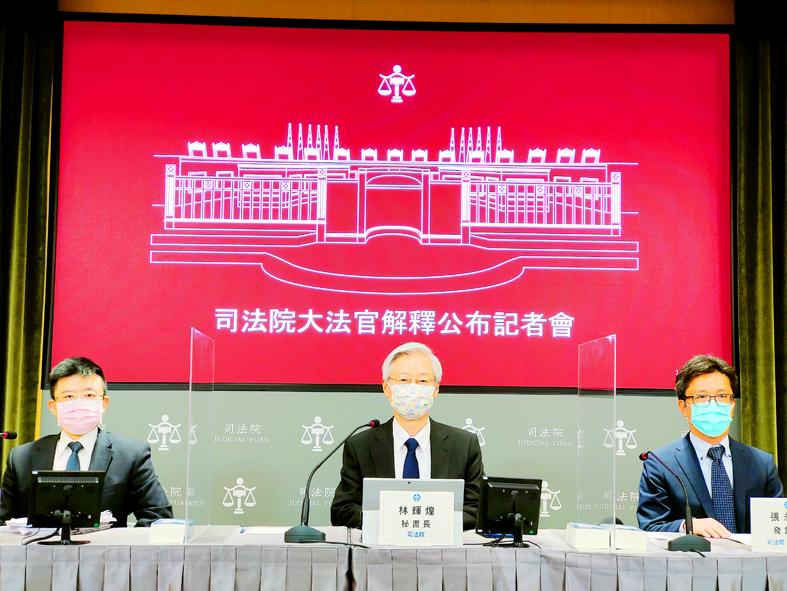Female workers cannot refuse employers’ requests to work night shifts unless they have proper cause, the Council of Grand Justices said yesterday.
Constitutional Interpretation No. 807 states that Paragraph 1, Article 49 of the Labor Standards Act (勞動基準法), which prevented employers from forcing women to work nights, is invalid, as it runs counter to Article 7 of the Constitution, the council said, annulling the article effective immediately.
The first paragraph of Article 49 states that employers cannot force women to work between 10pm and 6am without approval from a union.

Photo: Wu Cheng-feng, Taipei Times
Employers could, with union approval or through an agreement with the worker, avoid this requirement by providing a safe and clean environment for them, or when there is no public transportation available, an employer must provide transportation or dormitories for female workers.
Employers asking women to work a night shift would have to ensure that work standards and facilities comply with regulations under the Labor Standards Act, the Occupational Safety and Health Act (職業衛生安全法) and the Act of Gender Equality in Employment (性別工作平等法), the council said.
The protection offered under paragraph 5 of the article — such as forbidding pregnant women, or women who are breastfeeding from working night shifts — has also been removed.
A request for an interpretation was filed after Carrefour and China Airlines Ltd (中華航空) were penalized for contravening Paragraph 1, Article 49 of the Labor Standards Act.
The Taipei High Administrative Court had also filed a separate call for a constitutional interpretation regarding the same paragraph.
Additional reporting by Chen Chia-yu

DEFENDING DEMOCRACY: Taiwan shares the same values as those that fought in WWII, and nations must unite to halt the expansion of a new authoritarian bloc, Lai said The government yesterday held a commemoration ceremony for Victory in Europe (V-E) Day, joining the rest of the world for the first time to mark the anniversary of the end of World War II in Europe. Taiwan honoring V-E Day signifies “our growing connections with the international community,” President William Lai (賴清德) said at a reception in Taipei on the 80th anniversary of V-E Day. One of the major lessons of World War II is that “authoritarianism and aggression lead only to slaughter, tragedy and greater inequality,” Lai said. Even more importantly, the war also taught people that “those who cherish peace cannot

STEADFAST FRIEND: The bills encourage increased Taiwan-US engagement and address China’s distortion of UN Resolution 2758 to isolate Taiwan internationally The Presidential Office yesterday thanked the US House of Representatives for unanimously passing two Taiwan-related bills highlighting its solid support for Taiwan’s democracy and global participation, and for deepening bilateral relations. One of the bills, the Taiwan Assurance Implementation Act, requires the US Department of State to periodically review its guidelines for engagement with Taiwan, and report to the US Congress on the guidelines and plans to lift self-imposed limitations on US-Taiwan engagement. The other bill is the Taiwan International Solidarity Act, which clarifies that UN Resolution 2758 does not address the issue of the representation of Taiwan or its people in

US Indo-Pacific Commander Admiral Samuel Paparo on Friday expressed concern over the rate at which China is diversifying its military exercises, the Financial Times (FT) reported on Saturday. “The rates of change on the depth and breadth of their exercises is the one non-linear effect that I’ve seen in the last year that wakes me up at night or keeps me up at night,” Paparo was quoted by FT as saying while attending the annual Sedona Forum at the McCain Institute in Arizona. Paparo also expressed concern over the speed with which China was expanding its military. While the US

‘FALLACY’: Xi’s assertions that Taiwan was given to the PRC after WWII confused right and wrong, and were contrary to the facts, the Ministry of Foreign Affairs said The Ministry of Foreign Affairs yesterday called Chinese President Xi Jinping’s (習近平) claim that China historically has sovereignty over Taiwan “deceptive” and “contrary to the facts.” In an article published on Wednesday in the Russian state-run Rossiyskaya Gazeta, Xi said that this year not only marks 80 years since the end of World War II and the founding of the UN, but also “Taiwan’s restoration to China.” “A series of instruments with legal effect under international law, including the Cairo Declaration and the Potsdam Declaration have affirmed China’s sovereignty over Taiwan,” Xi wrote. “The historical and legal fact” of these documents, as well